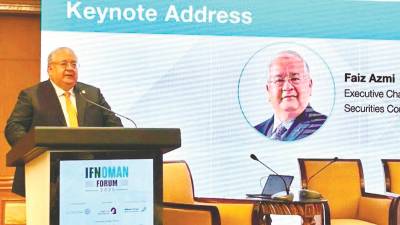PETALING JAYA: Internationalisation will be a defining feature of Malaysia’s next phase of capital market development, said Securities Commission Malaysia (SC) chairman Datuk Mohammad Faiz Azmi, as the regulator prepares to launch its Capital Market Masterplan 4 (CMP4) by the end of the year.
“Internationalisation is a central pillar of our strategy, including in the SC’s upcoming Capital Market Masterplan 4,” Faiz told delegates at the IFN Oman Forum 2025 in Muscat, Oman, today.
“We intend to articulate to the market why we need to seek out new investors around the world and not just from the traditional markets we have now. We need to find new friends and rekindle old relationships. And that is why we are here in Oman,” he said in his keynote address.
Faiz noted that Malaysia’s capital market – already one of the world’s most developed Islamic financial ecosystems – must continue to strengthen trust and efficiency while expanding its global reach.
“The SC’s role is to ensure that as these opportunities grow, our market remains efficient, well-governed, and trusted,” he said.
A key foundation for this vision is the SC’s Maqasid Al-Shariah Guidance Islamic Capital Market Malaysia, released in 2023, which underscores that finance must deliver value beyond profit.
“Finance must serve a higher purpose other than just making profits,” Faiz said. “It is not just about making a profit, but how you made that profit. In my part of the world, my investors want to know which investments would meet our common Shariah principles from those that do not.”
He added that the guidance has become a vital benchmark for aligning Malaysia’s Islamic capital market with ethical, sustainable, and values-driven growth.
By embedding Maqasid Al-Shariah principles, the SC aims to ensure that future products and investments remain anchored in fairness, stewardship, and inclusivity, while appealing to a wider base of global investors.
Human capital, Faiz stressed, will be equally crucial in shaping the next phase of market growth.
“Successful execution requires human capital and specialised skill sets,” he said. “The SC’s upcoming Capital Market Masterplan 4 will emphasise developing pathways for syariah advisers, fintech specialists, and sustainability professionals.”
Investing in talent, he added, is essential to ensure the Islamic finance industry continues to expand not only in scale but also in quality and impact.
“By investing in future skills, we can ensure the industry has the capacity to grow and serve, both in terms of quality and impact,” Faiz said.
To accelerate capacity building, Faiz proposed greater collaboration across jurisdictions.
“From a strategic perspective, joint talent ecosystems could be effective, with co-branded certifications, regulator-to-regulator fellowships, and case-based learning,” he explained.
“After all, competitive advantage for Islamic finance is not found within products or platforms, but in the people entrusted to design, promote, and supervise offerings,” he added.
Such initiatives, Faiz said, would not only strengthen international linkages but also prepare a new generation of leaders to drive the industry forward. “Looking ahead, we can explore similar initiatives with the GCC, nurturing the next generation of leaders who will carry our industry forward.”
